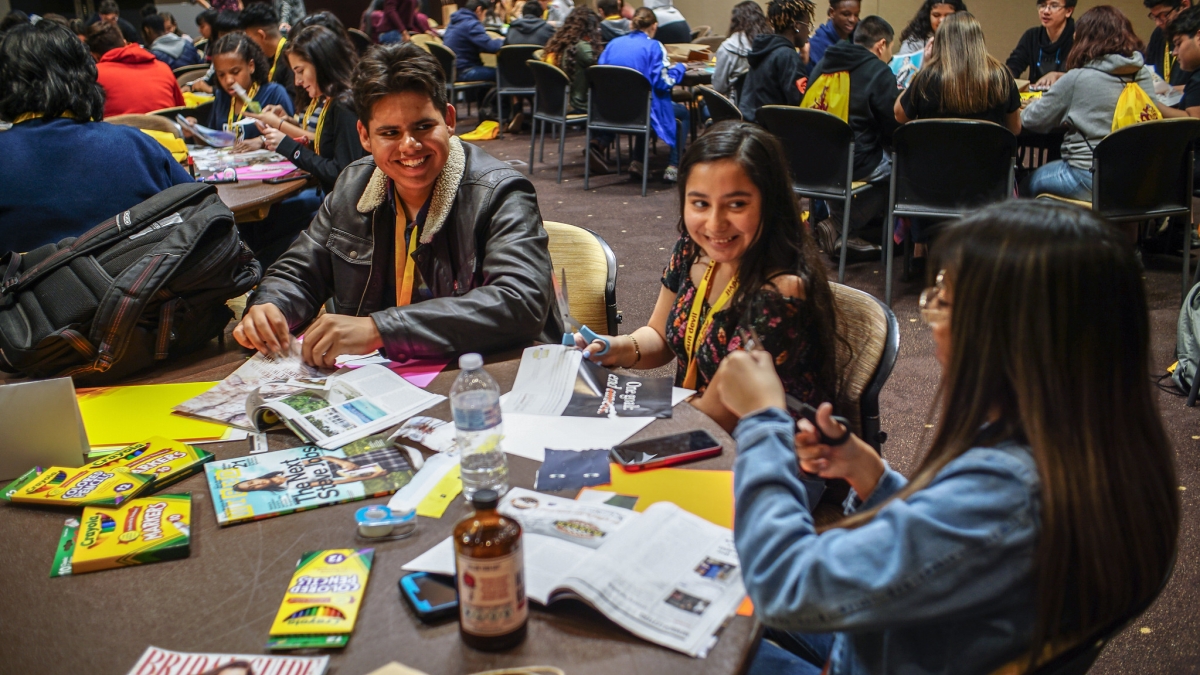Most diverse ASU freshman class wraps up first year

Students at the 2019 AVID conference at ASU's Tempe campus. AVID is one of many K–12 programs and initiatives at ASU.
Sun Devils enrolled in the largest and most diverse Arizona State University class are finishing their first year, and their demographics forecast a changing higher education landscape within Arizona.
Among the class of 2022, 45.5% are from minority backgrounds, and 62% are from Arizona. Of the first-year students from Arizona, 54% are from an underrepresented group.
Arizona currently lags behind other states in the number of adults earning postsecondary degrees or credentials, and the fastest-growing population in Arizona — Latinos — are underrepresented in higher education.
According to the Helios Foundation, 20% of Latino Arizonans earn an associate degree or higher. Since Arizona will soon be a “minority-majority” state, with the Latino population projected to show the most growth, the gaps in access to higher education are becoming an even more urgent problem to address.
Advancing the freshman class at ASU represents a step toward some of the ambitious inclusion and community goals of ASU’s charter. The college readiness and outreach work of Access ASU and community partnerships reach students across the state and in many different ways: in classrooms, at on-campus programs and when students are enrolled at ASU.
Carolina Solis is part of the current, historic freshman class, and she’s also working to expand higher education access to underrepresented Arizonans. An accountancy major from Yuma, Solis has loved being among high-achieving students within the Leaders Academy, an initiative of the W. P. Carey School of Business at ASU.
Solis said she especially appreciates the leadership opportunities provided to program participants and being surrounded by motivated peers.
“I am surrounded by students who want to do well in school and want to pursue great careers,” said Solis, who plans to pursue forensic accounting.
Her feeling of belonging was enhanced even more when she started working for Access ASU and realized the diversity of the populations the office serves. Solis is a summer programs mentor who works with the Barrett Summer Scholars, a residential program that provides academically talented eighth-10th grade students with the opportunity to experience college firsthand and prepare for successful enrollment. She also serves as a resource to Barrett Summer Scholars program alumni as they complete their journey from high school to college.
As a Latina from Yuma, Solis said she appreciates working in an atmosphere that seeks to include underrepresented and rural students from all corners of Arizona.
“I found my people, in other words, at work,” she said.
Access ASU programs have been more intentionally focused in places like Yuma, hosting in-school programs such as American Dream Academy, an eight-week college literacy program, as well as bringing current ASU students from the SPARKS program to Yuma to provide outreach to K–12 students for the past three years. ASU Prep Digital has also worked with the Yuma Union High School District on an adaptive math curriculum to support students’ academic growth.
Efforts like this are all part of building up degree attainment for rural and underrepresented Arizonans and opening up access to higher education.
“Ultimately we are focused on growing the K–12 student population in Arizona who are prepared to enter and succeed at ASU,” said Lorenzo Chavez, assistant vice president for outreach within Educational Outreach and Student Services at ASU.
“We are focused on making access to education a priority for all students, and we are committed to helping them succeed once they get here to the university.”
Chavez said ASU’s K–12 programs and initiatives have served nearly 127,000 students, families and educators to date with plans for continued growth, thereby positioning the class of 2023 and beyond to be the biggest and brightest classes in ASU history.
More Arts, humanities and education

ASU professor’s award-winning book allows her to launch scholarship for children of female shrimp traders in Mexico
When Arizona State University Associate Professor Maria Cruz-Torres set out to conduct the fieldwork for her third book, "Pink…

Herberger Institute Professor Liz Lerman to be honored as Dance Magazine Award winner
Dance Magazine has announced that Arizona State University Herberger Institute Professor Liz Lerman will be honored as a…
AI literacy course prepares ASU students to set cultural norms for new technology
As the use of artificial intelligence spreads rapidly to every discipline at Arizona State University, it’s essential for…